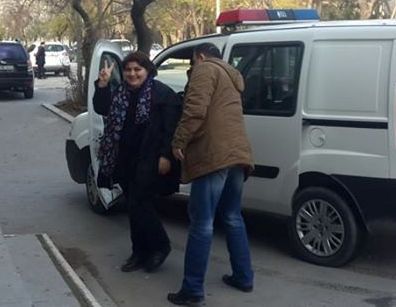
Khadija Ismayilova arrives in court in Azerbaijan.
Journalist Khadija Ismayilova, a Radio Free Europe/OCCRP reporter, was taken into custody yesterday in Baku, Azerbaijan, in the latest of a series of legal moves to put pressure on her.
Ismayilova, known for her investigations into the business interests of the family of Azerbaijani President Ilham Aliyev, is charged in the latest case of inciting a man to commit suicide. She arrived at a court hearing this morning smiling and making a V-shaped peace gesture. After court deliberations, she was taken into pre-trial detention to last two months under section 125 of the country’s penal code.
Ismayilova, who is an award-winning journalist for Radio Free Europe/Radio Liberty’s Azerbaijani service, is accused of driving a freelance reporter to try to kill himself. Local sources say the man, who also used to contribute to RFE/RL, claims she persuaded bosses to stop working with him.
OCCRP editor Drew Sullivan said: “This looks and feels like an escalation of the harrassment Khadija has been facing by the government for reporting news relevant to the people of Azerbaijan. I encourage the government to tolerate investigative reporting and release Khadija and the others facing unfair detention.”
RFE/RL chief editor Nenad Pejic condemned the charges, which come one day after President Aliyev’s chief of staff Ramiz Mehdiyev issued a 60-page statement accusing Ismayilova of “defiance” and displaying a “destructive attitude toward well-known members of the Azerbaijani community” which “pleases [her] patrons abroad.” The statement adds that RFE/RL’s Azerbaijani service is on a “disgusting path,” and its employees work “for a foreign secret service.”
“The arrest and detention of Khadija Ismayilova is the latest attempt in a two-year campaign to silence a journalist who has investigated government corruption and human rights abuses in Azerbaijan. The charges brought against her today are outrageous. Khadija is being punished for her journalism,” Pejic said.
The OSCE’s representative on freedom of the media, Dunja Mijatovic, condemned Ismayilova’s arrest. “The arrest of Ismailova is nothing but orchestrated intimidation, which is a part of the ongoing campaign aimed at silencing her free and critical voice,” said Mijatovic.
If convicted, Ismayilova faces a prison sentence of three to seven years.
The investigative reporter is also facing charges in a separate case of criminal libel and releasing state secrets. She is under a travel ban issued by Azerbaijani authorities that prevented her from testifying at the US Congress in November at a hearing on corruption.
Ismayilova wrote for RFE/RL about the Azerbaijani telecom industry this summer, revealing the previously hidden involvement of President Aliyev’s daughters. She has also exposed graft in the construction and gold mining industries for OCCRP.
Ismayilova frequently posted updates to a Facebook page about free press issues and her ongoing trial, which centers around accusations of defamation brought against her in private criminal proceedings by former opposition activist Elman Hasanov. The page appeared to have been taken down today.
Hasanov, previously an activist for the Popular Front Party, claims that Ismayilova published two defamatory documents about him on her Facebook page earlier this year. He alleges that one document said that Azerbaijan’s Ministry of National Security (MNS) used a sex tape to blackmail him into becoming a paid informant for them, and the other was a report that claimed he had raped a woman in 1992 and used connections to have the charges dropped, after which the victim committed suicide.
Ismayilova says that while she did post a document about the alleged blackmail, she expunged all reference to Hasanov and his identity was never revealed. She further says she never posted any documents regarding the alleged rape case and knows nothing about it.
“I didn’t publish any document which named Elman Hasanov,” Ismayilova wrote in an explanation posted to Facebook on Oct. 11. “I erased (the) name and any information which would help identify (him).”
Ismayilova has been subject to repeated blackmail and gender-based smear campaigns. She sees the latest developments as a continuance of the Azerbaijani authorities’ long-standing harassment of her in connection with her journalistic work.

